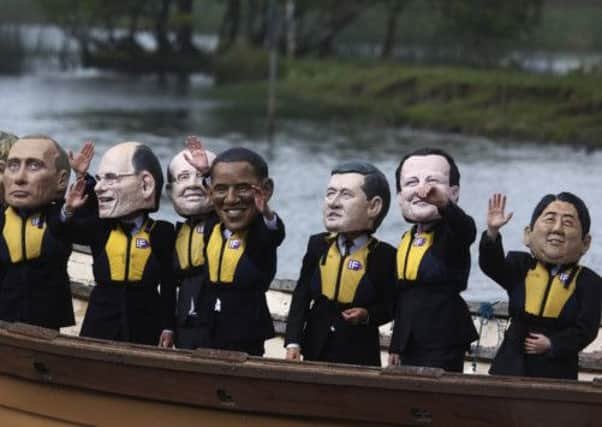Tensions grow over Syria as Putin warns West on arms


The two-year conflict, over which a dramatic gulf between Russia and the West, was the main topic of discussions at the official summit dinner in Lough Erne, Northern Ireland, last night.
After launching talks on an EU-US free trade deal yesterday, David Cameron hopes today to forge an agreement on greater sharing of tax information to prevent companies and individuals avoiding paying their fair share by hiding cash in offshore bolt-holes.
Advertisement
Hide AdAdvertisement
Hide AdBut scheduled discussions on trade, tax and transparency have so far had to jostle for attention with the contentious issue of whether to arm the rebels seeking to oust president Bashar Assad’s regime.
US president Barack Obama has said he may supply weapons to opposition forces while Russian president Vladimir Putin, Assad’s most powerful international backer, has warned the international community to be wary of arming militants who “eat the organs” of their enemies.
The issue was brought into sharper focus as Assad last night warned Europe would pay a price if it decided to arm Syrian rebels.
The Syrian leader also disputed the US assertion, backed by the UK, that his forces had used chemical weapons.
Advertisement
Hide AdAdvertisement
Hide AdIn a German newspaper interview, he said: “If the Europeans ship weapons, Europe’s backyard becomes a terrorists’ place, and Europe will pay a price for it.”
He warned: “Terrorists will return to Europe with fighting experience and extremist ideologies.”
The US has claimed chemical weapons, including the sarin nerve agent, had been used by government forces.
But Assad said: “Weapons of mass destruction are capable of killing hundreds, thousands at once. That’s why they are used.
Advertisement
Hide AdAdvertisement
Hide Ad“That’s why it is not logical to use chemical weapons to kill a number of people that can be achieved through conventional weapons.”
He added: “If Paris, London and Washington had only one piece of evidence backing up their allegations, they would have unveiled it to the world.”
Speaking ahead of the official opening of the summit yesterday, David Cameron said he was “as worried as anyone” about terrorist and extremist elements in the opposition forces.
But the Prime Minister insisted it was right to engage with the Syrian crisis and seek to put pressure on both sides to attend peace talks to discuss a transitional government for the country.
Advertisement
Hide AdAdvertisement
Hide AdIn a round of TV interviews, Mr Cameron said: “Let’s be clear – I am as worried as anybody else about elements of the Syrian opposition, who are extremists, who support terrorism and who are a great danger to our world.
“We should be on the side of Syrians who want a democratic and peaceful future for their country and one without the man who is currently using chemical weapons against them.
“What we can try and do here at the G8 is have further pressure for the peace conference and the transition that is needed to bring this conflict to an end.”
The EU is convinced a “critical juncture” has been reached in the conflict, European Council president Herman van Rompuy said.
Advertisement
Hide AdAdvertisement
Hide Ad“After tens of thousands of deaths, millions of displaced and refugees, we are in front of a fractured and radicalised Syrian society with a crisis affecting and even threatening the whole region,” he said.
Proposals for a peace conference in Geneva were “the best and the only possible chance we have to halt this conflict for which there is no military solution”, he added.
Numbers of Syrian refugees could reach 3.5 million by the end of the year if no progress is made on the peace process, he said, adding: “That perspective certainly creates a heavy burden on the shoulders of our leaders.”
London Mayor Boris Johnson and Foreign Secretary William Hague yesterday weighed in the issue as a poll revealed only 17 per cent of Britons supported arming the rebels.
Advertisement
Hide AdAdvertisement
Hide AdMr Johnson warned against doing so, saying that British weapons could end up in the hands of “al-Qaida-affiliated thugs”.
But Mr Hague said Britain must protect the Syrian opposition from being “exterminated”, warning that the crisis was “on a trajectory to get worse”.
The summit was taking place behind tight security, with 8,000 police around the venue lined up against hundreds of anti-austerity protesters.